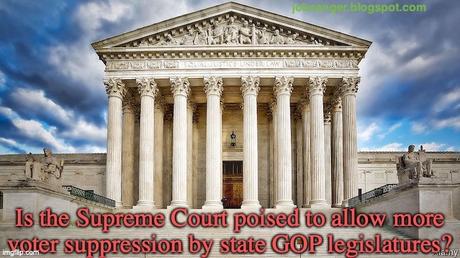
Since they lost the presidential election by more than 7 million votes, Republican legislators across the country are trying to pass laws to prevent voting by those they believe would vote for Democrats -- minorities, young people, etc.
Some of the hundreds of new voter suppression laws proposed have already been passed. And two of those new laws have reached the Supreme Court. One would restrict who can collect and deliver absentee ballots, and the other would throw out the votes of people who voted in the wrong precinct (even though it shouldn't matter what precinct they voted in for a presidential or senatorial election).
Those two cases came before the Supreme Court this week, and it looks like the 6-3 conservative majority on the court is poised to let state Republican legislatures suppress votes.
Here is just part of how CNN.com covered the court hearing:
Chief Justice John Roberts has singlehandedly slowed a conservative revolution at the Supreme Court in recent years, but he has for even longer -- 40 years -- opposed racial remedies and narrowly construed the landmark Voting Rights Act.
During oral arguments Tuesday in an Arizona voting rights case with national implications, Roberts sounded ready to hew to that latter path. The court's ruling could diminish the ability of Native American, Latino and Black voters to claim discrimination under the 1965 law. In 2013, Roberts led a narrow high court majority to eliminate separate Voting Rights Act coverage related to states with a history of bias. They no longer are required to obtain federal approval for new voting districts, poll closings or other electoral change -- which prompted some states to enact new voter ID requirements and polling changes.Tuesday's case, tied to a section of the law covering claims of intentional discrimination once a regulation is in place, could have greater repercussions arising as several states consider new voter restrictions, some based on lingering and unproven allegations of fraud from the 2020 election.Lawyers for the Democratic National Committee and Arizona Secretary of State told the justices wide swaths of Native Americans and other minorities could be disenfranchised by Arizona laws requiring ballots cast by people at the wrong precinct to be tossed and prohibiting most third parties -- beyond a relative or mail carrier -- from collecting absentee ballots, for example, at a nursing home. Roberts focused on potential voter irregularities, highlighting a finding from a 2005 bipartisan commission on absentee ballot fraud. Countering arguments that rural Native Americans and Latinos rely disproportionately on third parties to collect their ballots, Roberts questioned whether that should force states "to tolerate" possible fraud.The justices to Roberts' right appeared even readier to back the Arizona regulations. In the past as the justices wrestled with difficult social dilemmas, Roberts has inched to the center, sometimes with other conservatives, for a moderate ruling in these polarized times. Based on the tenor of oral arguments, the court majority appeared headed to the hard right.The new 6-3, conservative-liberal bench seemed to have sufficient votes to reverse a US appellate court and uphold the Arizona restrictions. The crucial additional question that would affect future litigation nationwide is what standard the majority adopts to resolve claims of voter discrimination based on race.
